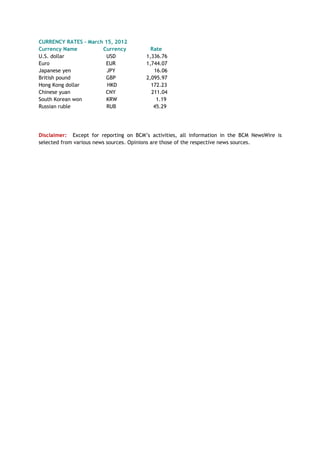The document summarizes business and economic news from Mongolia reported in Issue 213 of the Business Council of Mongolia NewsWire on March 16, 2012. Some of the key stories covered include:
- The IPO of Erdenes-Tavan Tolgoi (E-TT) being delayed by at least six months due to regulatory hurdles and political deadlock over Mongolia's parliamentary elections.
- Mitsui & Co. signing a cooperation agreement with E-TT that could lead to a purchasing agreement and Mitsui building infrastructure in Mongolia.
- Xanadu Mines preparing an exploration drilling program at its Sharchuluut Uul copper project in Mongolia.
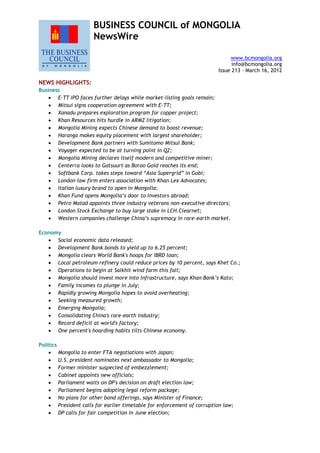
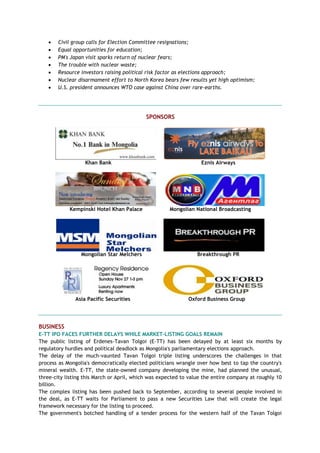
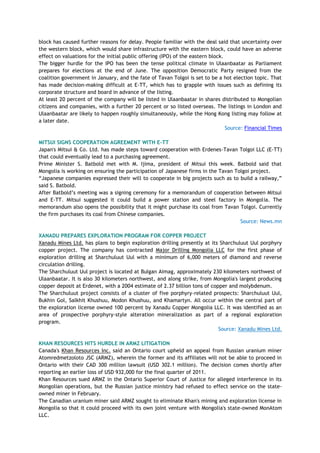
![―[The decision] raises the perturbing question as to how a company like ourselves can achieve
adequate recourse for its shareholders given the inability to even serve ARMZ without claim,‖ Khan
Resource's Chief Executive Grant Edey said in a statement.
The next stage of court sessions has been arranged for 10 April. The decision from the serial court
session from the London Court of International Arbitration will reportedly come at the end of June.
If the Mongolian government is found guilty it would reportedly owe USD 285 million to Khan
Resources. The first stage of court session was attended by a delegation led by as G. Bayasgalan,
State Secretary of Ministry for Justice and Home Affairs, just before the New Year.
Read more…
Khan Resources Inc. recently released its financial statement for the three months ended 31
December, reporting a USD 932,000 net loss. The company is also awaiting a response from the
Toronto Stock Exchange (TSX) to see whether it still meets listing requirements. The company said
in a statement that it anticipates the exchange will render a narrow interpretation of its rules and
guidelines.
Source: Reuters, Khan Resources Inc, Undesnii Shuudan
MONGOLIA MINING EXPECTS CHINESE DEMAND TO BOOST REVENUE
Mongolia Mining Corp., Mongolia's largest coking coal exporter, expects revenue to continue rising
this year because of demand from China.
―The trend will continue‖ after a surge in Chinese sales last year, Executive Director Battsengel
Gotov said.
Profits rose 98 percent to USD 119.1 million last year, matching the average USD 118.7 million
estimate of six analysts in a survey. Revenue climbed 96 percent to USD 542.6 million, the Hong
Kong-listed company reported.
The shares rose 4.2 percent to HKD 7.39 as of 10:55 a.m. local time, headed for the highest level
since 28 September. Mongolia Mining has fallen 24 percent in the past year, compared with the 11
percent decline in the benchmark Hang Seng Index.
Source: Bloomberg
HARANGA MAKES EQUITY PLACEMENT WITH LARGEST SHAREHOLDER
Haranga Resources Ltd. has agreed to issue 15 million new shares to Golden Rain Holdings Ltd., a
wholly owned subsidiary of Lippo China Resources Ltd., with Haranga Resource itself on the roster
of Lippo Group‘s assets.
The 15 million shares will be sold to Golden Rain at USD 0.40 a share for a total of USD 6 million, a
reported discount from the last closing price of USD 0.48 a share on 13 March. The placement will
nearly double Lippo Group‘s stake, increasing its holding from 7.35 percent to 13.92 percent. Lippo
has also agreed to a 12-month ―voluntary lock up period‖ for its entire 13.92 percent shareholding,
signaling its long-term confidence in Haranga Resources.
Haranga Resource will use the added liquidity to finance its exploration activities. This comprises
drilling required to define the full mineral inventory at its Selenge iron ore asset and completing
the Selenge Project Scoping Study. It will also use the funds to obtain a mining license for the
Selenge project as well as to pursue potentially significant additional iron ore acquisitions in
Mongolia.
Source: Haranga Resources Ltd.
DEVELOPMENT BANK PARTNERS WITH SUMITOMO MITSUI BANK
Sumitomo Mitsui Banking Corporation has struck up an alliance with the Development Bank of
Mongolia LLC to help meet the funding demands for large-scale projects.
The two banks signed a memorandum for the deal on 12 March. The Japanese bank entered the deal
due to its interest in Mongolia's rapid economic growth and aiding in projects related to railway
infrastructure and air pollution.
The governments of Japan and Mongolia have agreed to economic cooperation and are set begin
negotiations for a free trade agreement (FTA).](https://image.slidesharecdn.com/bcmnewswireissue213-160215131441/85/16-03-2012-NEWSWIRE-Issue-213-4-320.jpg)
![Source: Financial Post
VOYAGER EXPECTED TO BE AT TURNING POINT IN Q2
Voyager Resources Ltd.'s maiden resource in the next quarter is expected to be at a transitional
point supporting an attractive mid-scale development project with further significant upside
potential.
Voyager Resources is characterized as ―the most advanced, independent copper exploration and
development play in Mongolia,‖ with controlling interests at the KM and Khongor projects, located
atop of the same copper belt as Oyu Tolgoi. Recent aggressive exploration at KM has some drawing
comparisons to the Chilean porphyry systems.
Voyager Resources is looking to undertake a four-part strategy at KM to define a maiden resource,
determine the potential of the remaining 26 deposit veins already identified, learn more about a
primary source of mineralization, and begin feasibility study. The company has completed over
40,000 meters of drilling for its 50,000 program in the first 10 months of exploration. It also
continues to marginalize risks to its flagship project as it gains a better understanding of the deeper
primary mineralization potential.
Source: Ocean Equities
MONGOLIA MINING DECLARES ITSELF MODERN AND COMPETITIVE MINER
Mongolian Mining Corp. has announced its transition into a fully-fledged coal mining, processing,
transportation, and marketing platform.
The mining firm reported revenue of approximately USD 542.6 million for last year, a USD 265.1
million increase from the year before. Its shareholders equity base increased from USD 119.1
million, up USD 59 million, or 98.2 percent, from the year before.
Following this announcement, it reported it decision to borrow up to USD 300 million from a
commercial bank. The company is able to pay the loan in installments for 36 months. In the event
of default, MCS Holding LLC will give up at least 30 percent of its stake in the company.
Source: Mongolian Mining Corp.
CENTERRA LOOKS TO GATSUURT AS BOROO GOLD REACHES ITS END
Centerra Gold Inc.'s president and chief executive officer, Stephen Lang, expects 2012 to a busy
year.
―2012 will be a pretty busy year for us. I think particularly as we come out of the Mongolian
elections, looking to get the approvals for Gatsuurt finally moving,‖ said Lang. ―Once that happens
it'll take about two months for that to get into production and that'll bring [the mine in] Mongolia
where it's historically been for us at the 150,000 to 200,000 ounce a year level.‖
Lang said his company will be focusing on its Kumtor mine in the Kyrgyz Republic as well as a few
other development projects.
The company's 2011 gold production totaled 642,380 ounces, down from 678,941 ounces in 2010.
The lower production was attributed to the company's Boroo mine production dropping nearly 50
percent.
―That's really at the end of its mine life,‖ said Lang, adding later, ―Boroo has produced about 1.5
million ounces since we opened it in 2004.‖
Source: MarketWire
SOFTBANK CORP. TAKES STEPS TOWARD “ASIA SUPERGRID” IN GOBI
Softbank Corp. said it will tie up with Mongolian investment firm Newcom Group and Korea Electric
Power Corp. (KEPCO) in order to start a wind power generation project in the Gobi Desert in
Mongolia. Softbank believes the collaboration will be the first step toward realizing its ―Asia
supergrid‖ initiative of linking Asian countries with undersea cables for efficient management of
electricity supply and demand in the region.
The Japanese Internet and telecommunications conglomerate aims to transmit electricity to Japan
in the future, officials said. Newcom Group will be tasked with acquiring land and coordinating with](https://image.slidesharecdn.com/bcmnewswireissue213-160215131441/85/16-03-2012-NEWSWIRE-Issue-213-5-320.jpg)
![the Mongolian government. KEPCO will mainly design the power grid.
For the time being, the three partners will develop technologies for the Mongolian wind power
project, as well as for electricity generation by photovoltaic and other natural resources. Details of
the Mongolian project, such as the scale of spending, have yet to be decided.
Source: Power Engineering
LONDON LAW FIRM ENTERS ASSOCIATION WITH KHAN LEX ADVOCATES
Ulaanbaatar-based Khan Lex Advocates LLC signed a formal association agreement with London-
based international law firm Clyde & Co.
Clyde & Co. Is a global law firm with a network including 27 offices and associated offices in the
Americas, Asia Pacific, Europe and Middle East regions. It has been steadily increasing its range of
advice to Mongolian clients and to other clients looking to do business in Mongolia.
Clyde & Co. international trade partner Stephen Tricks said: ―We can now link our clients to a law
firm that is not only first rate in terms of ethos and quality, but also has a unique experience with
the legislative codes and considerable insight into the Mongolian government.‖
Although established in the capital just last year, Khan Lex Advocates was chosen by Clyde & Co.
for the firm's strong background in both the private and public sectors.
Khan Lex Advocates managing partner B. Enkhbat said: ―This association with Clyde & Co. enables
us to work with an international law firm that has a long track record of assisting its clients in
emerging markets and particularly in the areas of mining, energy, financial services, infrastructure
and international trade.‖
Source: Khan Lex Advocates LLC
ITALIAN LUXURY BRAND TO OPEN IN MONGOLIA
In an effort to cover the Eurasian region more thoroughly, Italian luxury leather-goods producer
Coccinelle will open a name-brand store in Mongolia. Business Development Director for Coccinelle,
Antonio Sottile said locales such as Mongolia and Kazakhstan are not to be overlooked with their
booming economic growth fueled by their mineral and petroleum sectors.
―We'll be the first Italian brand of leather when we open in Mongolia later this month. ―We're also
expanding in unusual territories like China and Kazakhstan.‖
Sottile admitted that Italian brands, including Coccinelle, are having a hard time producing the
entirety of their products in Italy. He noted that it has been a trend in the past few years to
outsource production to China and other countries. He said the Italian brand and the fact that his
company's products are made of leather 100 percent from Tuscany are most important. The director
also shared his worries over the bigger corporations buying out smaller family-owned brands, as
happened in the acquisition of the 150-year-old La Rinascente, a famous upscale Italian department
store, by a Thai company last year.
The brand has also been receiving numerous offers, especially from Southeast Asia and Russia--
‖we're a very strong brand in this region,‖ said Sottile. However, he noted that most acquisitions do
not affect the direction or heritage of a brand.
Source: Business World Online
KHAN FUND OPENS MONGOLIA'S DOOR TO INVESTORS ABROAD
The Khan Mongolia Equity Fund has worked in the interest of both Mongolia's private sector and
investors, focusing to provide equity to Mongolian mining companies, with 30 percents of its assets
in the Mongolian Stock Exchange (MSE). The fund, which is billed as to presenting diversified and
liquid exposure to ―one of the world's most resource rich and fastest growing economies,‖ is open
to investors worldwide.
―When investing in the Mongolian growth story, it's fair to say though that it's hard to avoid the
mining sector and mining related industries,‖ said Travis Hamilton, founder of the fund, adding,
―[T]he significant amounts of investment that have been made in the mining sector over the last
several years are already providing significant spillover effects into other areas of the economy.‖
The fund's objectives are to attain growth opportunities through investment of equities to securities](https://image.slidesharecdn.com/bcmnewswireissue213-160215131441/85/16-03-2012-NEWSWIRE-Issue-213-6-320.jpg)
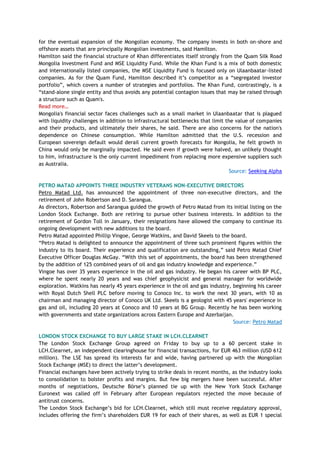
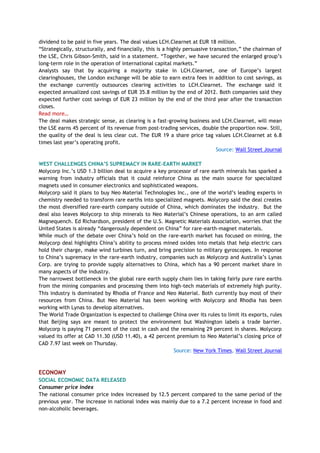
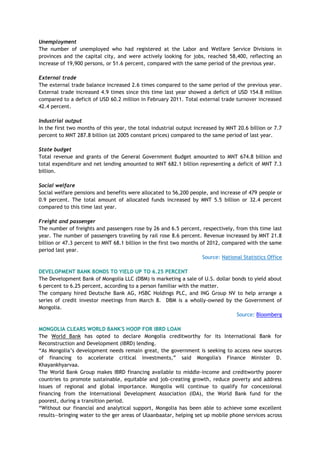
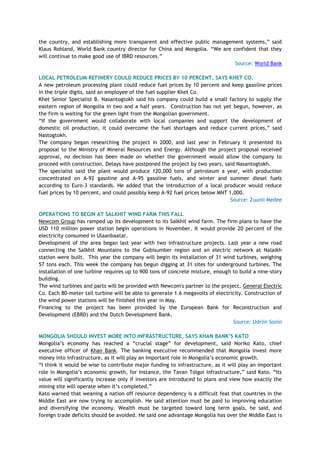

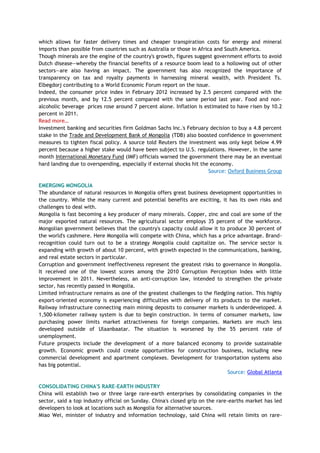
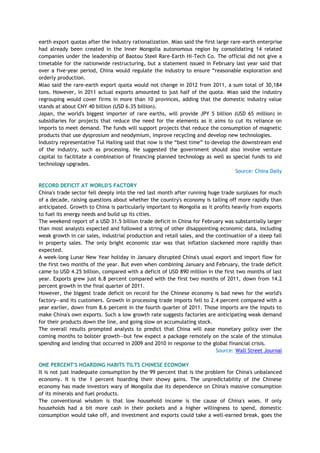
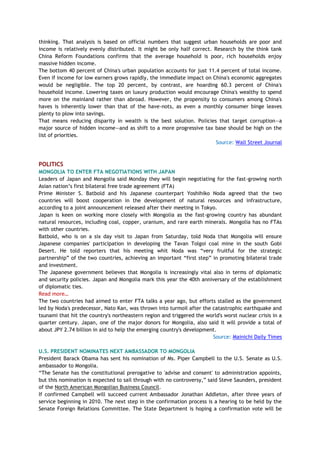
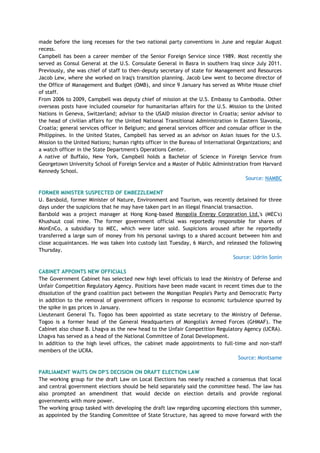
![plan to hold state and regional elections separately. This point has been backed by all parties
except for the Democratic Party (DP), said MP D. Dondog, the head of the working group. He said
there is a rumor that the DP is waiting to hear from regional representatives before deciding on the
draft law.
The working group responsible for the election law is a multi-partisan collaboration comprised of
groups representing each party and is lead by D. Lundeejantsan of the MPP and Z. Enkhbold of the
DP for discussion. The working group head said each representative party's proposal is the same
except for the dates for when the local election should be held. It will be up to Parliament to
decide on one proposal for debate, rather than further complicate matters by debating two or more
proposals, he added.
Additionally, a draft law has already been signed by 40 MPs to initiate an amendment to the
Constitution for improved local governance and decentralization. The working groups have agreed a
general ballot should be held asking if the appointed authorities for self governance should be
chosen by the party in power or the people; and if local elections should be held separately from
state elections.
Read more…
MP D Baldan-Ochir explained that state and local elections cannot be held on the same day due to
difficulties such as state election will be counted by machine while local elections by hand. State
elections will also be held two hours longer, ending at 22:00 compared with elections to end a
20:00.
A discussion on the proposed amendment will be held during the spring session of Parliament.
Dondog said the general ballet for the amendment will be held at the same time as state elections.
Source: Undesnii Shuudan
PARLIAMENT BEGINS ADOPTING LEGAL REFORM PACKAGE
Parliament adopted a package of laws during a special session that would bring greater strength to
the legal system. Members were able to pass 16 laws and three resolutions, reported Parliament
Vice Chairman N. Enkhbold.
Introduced by President Ts. Elbegdorj, the package included 6 laws, three of which have been
adopted already. Those passed are the Law on Court, Law on Judgment, and Law on Layers. The
new laws give more freedoms and independence to the courts, regulate pressures placed on judges
and provide opportunities to increase their abilities. The passage makes good on Elbegdorj's vowed
to reform the justice system after taking office.
Policy makers plan to discuss the remaining three draft laws in the upcoming spring session of
Parliament. Those three remaining include the Law on Court Administration, Law on the
Representation of Citizens in Court, and The Law on Consent. The main focus of the laws was to
increase the salaries of civil workers and pensions to the elderly.
Parliament has left the Law on Elections for the spring session as the law still needs further
development.
Source: News.mn, Udriin Sonin
NO PLANS FOR OTHER BOND OFFERINGS, SAYS MINISTER OF FINANCE
The Ministry of Finance has denied rumors that it would release a bond offering ahead of the
Development Bank of Mongolia's planned offering of USD 600 million Euronote bonds over the
Singapore Stock Exchange (SGX).
Finance Minister D. Khayankhirvaa said that although MPs such as O. Chuluunbat have proposed an
official bond offering, the Ministry of Finance does not have any plans to do so.
―We will study [Chuluunbat's proposal]. By study, I mean after considering the proposal at the level
of the Ministry of Finance, it should be submitted to government. As everyone knows, it will take
more time for the submission to Parliament if it is indeed approved by government.
Khayankhirvaa said his ministry is currently focused on selling bonds issued by the Development
Bank to markets in England and Hong Kong. He said he expected the work to be completed by next
week.](https://image.slidesharecdn.com/bcmnewswireissue213-160215131441/85/16-03-2012-NEWSWIRE-Issue-213-16-320.jpg)
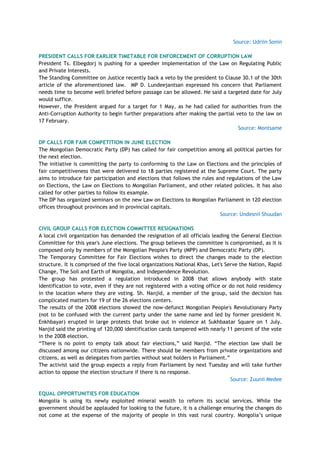
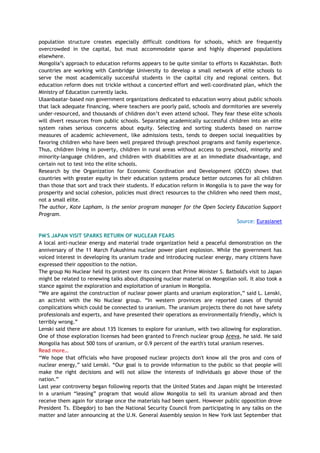
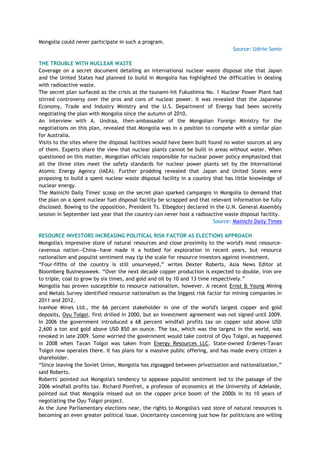
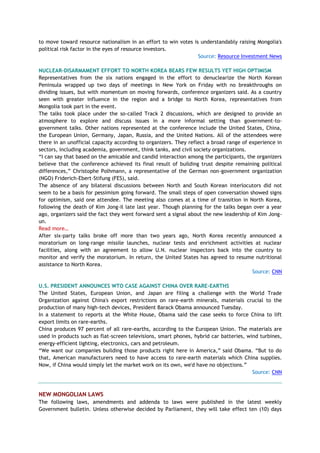
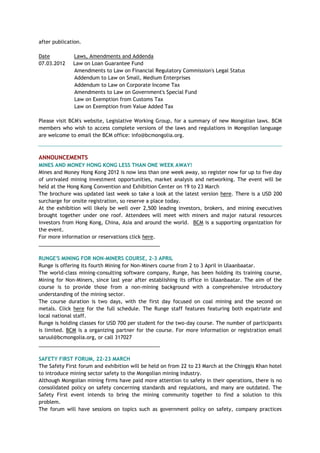
![(case studies), safety management, and the best safety technologies.
For registration, visit safetyfirst.mn or for more information call 31 4877 or +976 9916 9954.
___________________________________________
BCM TO HIRE WORKING GROUP COORDINATOR
The Business Council of Mongolia seeks to recruit a Working Group Coordinator.
The position would require one to take charge of managing the BCM working groups. Tasks would
include arranging meetings for the working groups, including contacting speakers as necessary; take
minutes of meetings; communicate with working group members; and update BCM staff regularly on
issues and recommendations from working group members. In addition, the selected candidate
would provide other assistance to BCM officers as assigned.
Main requirements include excellent communication skills, fluency in both Mongolian and English
languages, strong knowledge of general business, excellent interpersonal and communication skills,
and good computer skills. Candidates should be self motivated, resourceful, and attentive to
details.
For more information please email your CV by 23 March 2012 to info@bcmonoglia.org. The position
can be either full or part time. Only short listed candidates will be contacted.
___________________________________________
“MM TODAY” ON MNB-TV, FRIDAYS AT 18:30 [TONIGHT]
BCM is pleased to announce Mongolian National Broadcasting continues its cooperation with BCM on
―MM Today‖. This English news program is aired every Friday for 10 minutes and is scheduled for
18:30 tonight! Tune in to watch this program that reports stories from today‘s BCM NewsWire.
___________________________________________
“BSPOT” ON B-TV, MONDAY TO FRIDAY AT 18:20
B-TV (Business TV) now telecasts a 10-minute English-language news program called BSPOT every
evening from Monday to Friday at 18:20, taking most of the stories from the BCM NewsWire.
___________________________________________
POSTINGS ON BCM‟S ENGLISH WEBSITE 'PRESENTATIONS' AND 'MONGOLIA REPORTS' SECTIONS
AND BCM‟S MONGOLIAN WEBSITE „PRESENTATIONS‟ AND „NEWS‟ SECTIONS
New for 2012 is a ‗Presentations‘ section on the BCM Mongolian website which can be reached via
link to bcm.mn/itgeluud. Several presentations are already posted including 9 from Coal Mongolia
on February 9-10, 2012.
As a key component of BCM‘s Mongolian website, ‗News‘ section, articles from the Government‘s
―Open-Government.mn‖ site are regularly posted.
On BCM‘s English website, ‗Resource, Presentations‘ section, for your review are 11 presentations
from Coal Mongolia 2012, 7 speeches from the Mongolian Investment Summit on December 8-9 in
London, several speeches at the Risk Management Forum on November 8 co-organized by BCM and
Mandal Insurance, speeches at Discover Mongolia 2011, and speeches from BCM‘s last 12 monthly
meetings in 2011-2012.
Also on BCM‘s English website, ‗Resource, Mongolia Reports‘ section, please note "Blitz and Lead" by
Sant Maral Foundation on August 2011, Z. Batbayar, Deputy Director of the Water Authority, at
BCM‘s Environmental Working Group‘s recent meeting and the Polit Barometer-May 2011 from Sant
Maral Foundation.
We are now posting some news stories and analyses relevant to Mongolia on the BCM website's
‗Mongolian Business News‘ as they come, instead of waiting until Friday to put them all together in
the weekly NewsWire. The NewsWire will, however, continue to be issued on Friday, and will
incorporate items that are already on the home page, so that it presents a consolidated account of
the week‘s events.
___________________________________________](https://image.slidesharecdn.com/bcmnewswireissue213-160215131441/85/16-03-2012-NEWSWIRE-Issue-213-22-320.jpg)
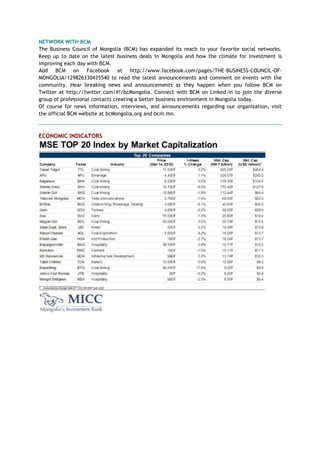
![INFLATION
Year 2006 6.0% [source: National Statistical Office of Mongolia (NSOM)]
Year 2007 *15.1% [source: NSOM]
Year 2008 *22.1% [source: NSOM]
Year 2009 *4.2% [source: NSOM]
Year 2010 *13.0% [source: NSOM]
Year 2011 *10.2% [source: NSOM]
February 29. 2012 *12.5% [source: NSOM]
*Year-over-year (y-o-y)
CENTRAL BANK POLICY RATE
December 31, 2008 9.75% [source: IMF]
March 11, 2009 14.00% [source: IMF]
May 12, 2009 12.75% [source: IMF]
June 12, 2009 11.50% [source: IMF]
September 30, 2009 10.00% [source: IMF]
May 12, 2010 11.00% [source: IMF]
April 28, 2011 11.50% [source: IMF]
August 25, 2011 11.75% [source: IMF]
October 25, 2011 12.25% [source: IMF]](https://image.slidesharecdn.com/bcmnewswireissue213-160215131441/85/16-03-2012-NEWSWIRE-Issue-213-24-320.jpg)
